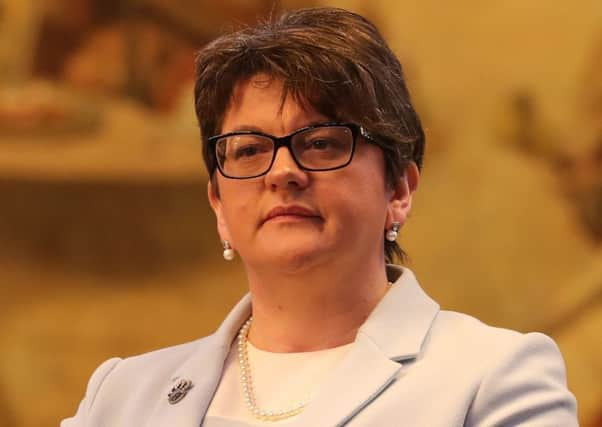Foster made key early RHI decision personally, papers reveal


Speaking during his opening statement to the public inquiry into the RHI scandal, counsel for the inquiry referred to a series of documents which will be opened in more depth as the inquiry progresses.
David Scoffield QC said that before the scheme was launched in late 2012, the department had faced a decision as to whether it chose to adopt a simple grant scheme, an ongoing incentive scheme or what is known as a ‘challenge fund’.
Advertisement
Hide AdAdvertisement
Hide AdOfficials put a submission to Mrs Foster, he said, but it contained no clear recommendation and a meeting was convened, at which the then Enterprise Minister and her Spad, Andrew Crawford, were present.
Mr Scoffield said that amid the voluminous paperwork created in the department there “seems to be no clear record of what was discussed or decided at the meeting”.
However, an email followed from Mrs Foster’s private office saying that she was “content” to proceed with what would become the RHI scheme.
Mr Scoffield noted that “usually this would be the formulation that the minister was agreeing to a recommendation....in this instance the decision was essentially left to the minister’s own judgment”.
Advertisement
Hide AdAdvertisement
Hide AdThat decision was important because one of the issues which the inquiry is attempting to establish is whether an incentive scheme was the right way in which to encourage people to shift to renewable energy.
The inquiry also confirmed through Mr Scoffield yesterday that Mrs Foster will be one of the last witnesses to give evidence.
He described the former first minister as “one of the most senior people we are likely to question in this chamber”.
Mr Scoffield said that the reason for calling the most senior figures towards the end was partly an attempt to encourage more junior officials to speak candidly without contradicting something which a more senior figure had already said.
Advertisement
Hide AdAdvertisement
Hide AdIn a cryptic allusion to what some officials have already said in written evidence statements, Mr Scoffield said that some of the documents “suggest this hope is not misplaced”.
Mr Scoffield said that the investigation – which has set no indicative time limit on itself but which some close observers believe will still be going on in 12 months’ time – is likely to give the public an “unprecedented insight into the machinery of government in Northern Ireland”.
Only one civil servant – whose name was not disclosed yesterday – has been excused from attending the hearings, for medical reasons.
The inquiry will also focus on how whistleblower claims on the RHI were handled.
Advertisement
Hide AdAdvertisement
Hide AdThe opening session heard that an application for anonymity from one key person who attempted to personally alert Arlene Foster to the problem had been declined by Sir Patrick.
The businesswoman, who said that she was a “concerned citizen” rather than a whistleblower, had emailed Mrs Foster and met her officials early in the scheme but said that her warnings were dismissed.
Mr Scoffield said that Sir Patrick had taken the view that the legal test for granting anonymity was not met in that case and so she would be named.
The barrister noted there would be those who would like to see the appearance of certain witnesses “fast forwarded” to an earlier date.
Advertisement
Hide AdAdvertisement
Hide AdHe said the sequencing of witnesses was a matter for the inquiry and would be determined solely on what was most conducive to its work, not on “other considerations” and stressed its complete independence on such matters.
He said that among the areas which the inquiry would examine was whether there had been any “improper patronage” and whether some within the then Department for Enterprise, Trade and Investment (DETI) had effectively viewed the RHI funding stream as “free money” because they were operating under the erroneous view that it was not coming directly from the Treasury and therefore not from the department’s budget.
He asked: “Was there a different culture or attitude depending on which funding stream it was coming from?”